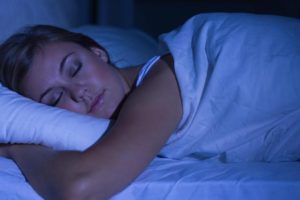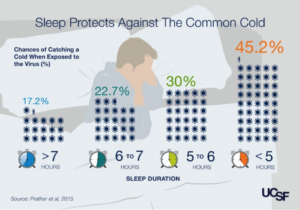How Much Sleep Does Your Immune System Need?
Your mother said you’d get sick if you didn’t get enough sleep. Turns out she was right (again). Researchers have found that the neurons controlling sleep in the brain are in constant conversation with your immune system. Hormones and neurotransmitters flow back and forth between your brain cells and your immune cells, adjusting your immune response to your sleep/wake patterns. What your immune system needs as much as anything is a good night’s sleep.
 When you are sick, your immune system prompts your body to sleep more. When you don’t get enough sleep, your brain can’t stimulate a proper immune response. Numerous sleep studies have shown that people who don’t get quality sleep or enough sleep are more likely to get sick after being exposed to a virus.
When you are sick, your immune system prompts your body to sleep more. When you don’t get enough sleep, your brain can’t stimulate a proper immune response. Numerous sleep studies have shown that people who don’t get quality sleep or enough sleep are more likely to get sick after being exposed to a virus.
During sleep your immune system releases proteins called cytokines, some of which help promote sleep. Certain cytokines need to increase when you have an infection or inflammation, or when you are under stress. Not getting enough sleep decreases the amount of cytokines you have, making it much more difficult for you to fight an infection.
You also produce far fewer cancer fighting natural killer cells when you don’t get enough sleep. A single night with only four hours of sleep can cause a 70% drop in your natural killer cells. A landmark study conducted in 1996 found that even a slight reduction in sleep produces a reduction in natural immune responses and cytokine production.
One sleepless night is not nearly as bad as chronic short sleep, night after night. Turns out most Americans fall into this sleep pattern. The average American gets 6.8 hours of sleep per night, which is down more than an hour from 1942. Forty percent of Americans get less than 7 hours of sleep per night. That’s an interesting number when you consider that forty percent of Americans are obese (more on that in a bit). The CDC and several other health organizations recommend that adults age 18 to 60 get seven or more hours of sleep each night. Looks like most of us could use a little more sleep.
Getting a full night’s sleep also improves your response to viral infections. In a study conducted at the University of Pittsburgh, volunteers allowed researchers to spray cold-inducing viruses up their noses. Participants who slept less than six hours a night were 4.5 times more likely to catch a cold than those who got seven or more hours. Since coronavirus is a “cold type” virus, now is definitely the time to make sure you are getting seven or more hours of sleep.

If you’re like most of us who are waiting on a vaccine to end this thing, you need to know that vaccines don’t work well if you’re not getting enough sleep. Another study conducted by the University of Pittsburgh found that people who sleep six hours or less per night were 11.5 times more likely to be unprotected from the vaccine than those who slept more than seven hours on average.
The two studies mentioned above seem to indicate that seven hours or more is the threshold for sleep in regard to dramatically improving your immune system. If you want to take a major step toward reducing your chances of becoming infected by a virus, start by getting seven or more hours of sleep every night.
Here are a few simple tips to help you sleep better:
1. Stick to a consistent schedule. Go to bed and get up at the same time each day. Yes, that includes weekends and vacations. Make sure you get a minimum of seven hours each night.
2. Use your bedroom for only sleep and sex. No TV in your bedroom. No work in your bedroom.
3. Don’t eat anything within two hours of bedtime. Food in your gut will keep you from sleeping well. Also, drink most of your water early in the day and less at night.
4. Keep your room cool. A bedroom temperature between 60°and 67°F tells your body it’s time to sleep.
5. Exercise Regularly. Healthy people sleep better. Just don’t work out within an hour of bedtime or you will be too invigorated to doze off.
Stay Strong and Healthy (and get enough sleep),
Bo Railey

